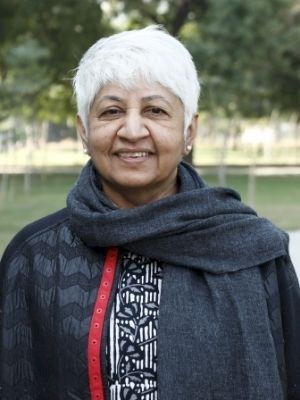Online Via Zoom


Shah Rukh Khan has been the bellwether for romantic aspirations and lived realities of millions of Indian women who grew up being entranced by his films. His movies and his public persona have inspired women from varied backgrounds to dream big and transcend the drudgery of their mundane lives.
Is the hero worship of Shah Rukh Khan by Indian women just fandom or is it a rebellion against social customs and norms? How has the actor shaped the lives and loves, and the interior as well as the circumscribed public lives of women? Is the desire for intimacy, and the dreams of female independence, metaphorically pinned on posters of Shah Rukh Khan’s movies? Has Shah Rukh Khan inspired fan-women to attain social mobility and financial autonomy?
Our speaker, an economist at the World Bank and an author, has extensively researched the economic and personal trajectories of India’s women. She uses the sisterhood of SRK fandom as a device to delve into deep social, cultural, and gender issues. Integrating anthropology, sociology, and economics, she will discuss how women with different social identities survive at the intersection of power and patriarchy.
Shrayana Bhattacharya is an Economist in the World Bank’s Social Protection and Labour unit for South Asia. Prior to joining the World Bank, she has worked with ISST, ILO, SEWA and Centre for Policy Research on a range of issues in the areas of urban bureaucracy, social protection and informality. She completed her post-graduation in public administration and economics from Harvard University.
Tejaswini Niranjana is Director, Centre for Inter-Asian Research, and Dean, Online Programmes. Before coming to Ahmedabad University, she was Professor and Head, Department of Cultural Studies, Lingnan University, Hong Kong, and Director, Centre for Cultural Research and Development. She is co-founder of the Centre for the Study of Culture and Society, Bangalore, which offered an innovative inter-disciplinary PhD programme from 2000-2012. During 2012-16, she headed the Centre for Indian Languages in Higher Education at the Tata Institute of Social Sciences, Mumbai, and was Indian-language advisor to Wikipedia. Professor Niranjana is the author of Siting Translation: History, Post-structuralism and the Colonial Context (University of California Press, 1992), Mobilizing India: Women, Music and Migration between India and Trinidad (Duke UP, 2006), and Musicophilia in Mumbai: Performing Subjects and the Metropolitan Unconscious (Duke UP, 2020). Her most recent edited volumes include Genealogies of the Asian Present: Situating Inter-Asia Cultural Studies (Orient Blackswan, 2015) with Wang Xiaoming; and Music, Modernity and Publicness in India (Oxford University Press, 2020).
For her translations from Kannada into English, she has won the Central Sahitya Akademi Award, the Karnataka State Sahitya Akademi Award, and the DSC Prize for South Asian Literature. She won the 2021 National Translation Award for Prose for her English translation of the book No Presents Please: Mumbai Stories, an anthology of short stories in Kannada authored by Jayant Kaikini. The award is given by the American Literary Translators Association.
She is curator of the Saath-Saath Project, a musical collaboration between Indian and Chinese performers: http://saathsaathmusic.com, and producer of three documentary films based on her music research (directed by Surabhi Sharma).